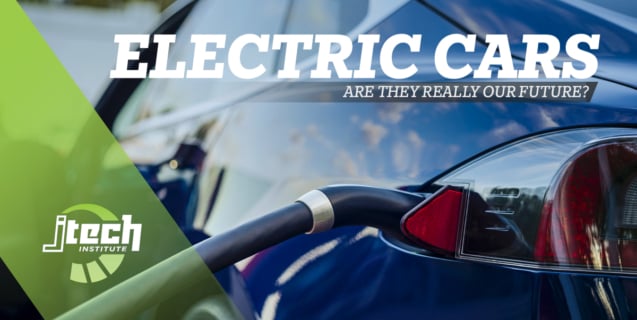To many people, the advent of the electric car (EV) might seem like a brave new world of advanced technology. But the EV has actually been around since the late 1800’s and was invented prior to Henry Ford’s gasoline-powered Model T. Unfortunately, for inventor William Morrison, the cost for the Model T was drastically less than the EV which could only get up to a whopping 14 miles per hour. Fast forward to the climbing oil prices and gasoline shortages of the 1960’s and 70’s and interest in the research and development of EV technology resurfaced. And as we ushered in a new era in 2000, environmental concerns, fossil fuel shortages and the quest for renewable energy and sustainability became a driving force behind global efforts to develop the technology into a more viable, eco-friendly solution to existing gas-powered vehicles. So, does that mean everyone will be plugging in their cars every night in the next ten years, instead of filling up at the gas station? Maybe – maybe not. To get a sense of what the future holds, let’s explore the state of things and perhaps learn a little more about the world of EV.
Not all EVs are created equally – We’ve all likely heard the word hybrid bandied about in the last decade and when it comes to EV’s, there are a few key differences of which to be aware. A hybrid EV or HEV, is just that – a vehicle with an engine that is powered by both gas or diesel fuel and electricity. Other vehicles operate solely on electricity from a battery (BEV) and still others are powered by hydrogen fuel cell (pHEV) technology which converts hydrogen gas into electricity. All three types of EV require an EV battery and a method of recharging.
The battery hurdle – Historically, one of the primary consumer concerns about EVs has been the charging time required to keep the battery at maximum capacity. Currently, there are 3 levels of charging, the first, Level 1, being the easiest – simply plugging into a standard 120v outlet. This is the slowest form of charging and can take more than 8 hours. Levels 2 and 3 are most commonly found at public charging stations or sometimes workplaces. Level 2 charging is 240v and takes around 4 hours to recharge, while the fastest, most powerful Level 3 charging stations are typically found in high transit areas and provides a 480v charge in 30 minutes or less. Obviously, Level 3 charging is the most efficient but access to one of these stations may be limited in your geographical area or not available at all. And there are a variety of factors that can affect the life of your EV battery. Extreme temperatures, use of electronics, vehicle heating and AC systems and even how you accelerate and brake.
Another big concern for consumers has been the cost of EV battery replacement. Fortunately, advances in battery technology have reduced the cost of EV batteries and industry experts predict the cost will continue to come down as technology improves. As governments work to reduce harmful pollution from fuel-related carbon emissions, more funding for research and the development is being allocated to EV technology, as well as to funding more public charging stations.
Is my EV as safe to operate as a gasoline-powered vehicle and can it reach the same speeds? The answer is a solid yes. EVs must meet all the same vehicle safety requirements as a standard vehicle and there are currently EVs that can reach speeds of between 100-130 MPH.
Can I afford an EV? While the cost of purchasing an EV is typically higher than a gas-powered vehicle, the market is getting more and more competitive and the government offers a variety of tax incentives and subsidies to consumers interested in owning an EV. There are also substantial fuel savings over the life of the vehicle to consider.
There are more than 3 million EVs on the road worldwide and in the global quest for eco-friendly transportation options, that number is likely to continue to grow. So, are EVs the future of automotive transport? With so many tangible benefits and a concerted effort to eliminate the hurdles and improve the technology, they may not take over the automotive industry, but they are definitely here to stay.
If you’ve always been fascinated by all things automotive and want to learn more about careers in the automotive technology industry – check out the programs at J-Tech Institute. J-Tech is training the next generation of automotive and diesel technology technicians. With a 168,000 square foot facility in beautiful Jacksonville, FL, we’re doing our part to keep things moving. Contact J-Tech today to learn more.
